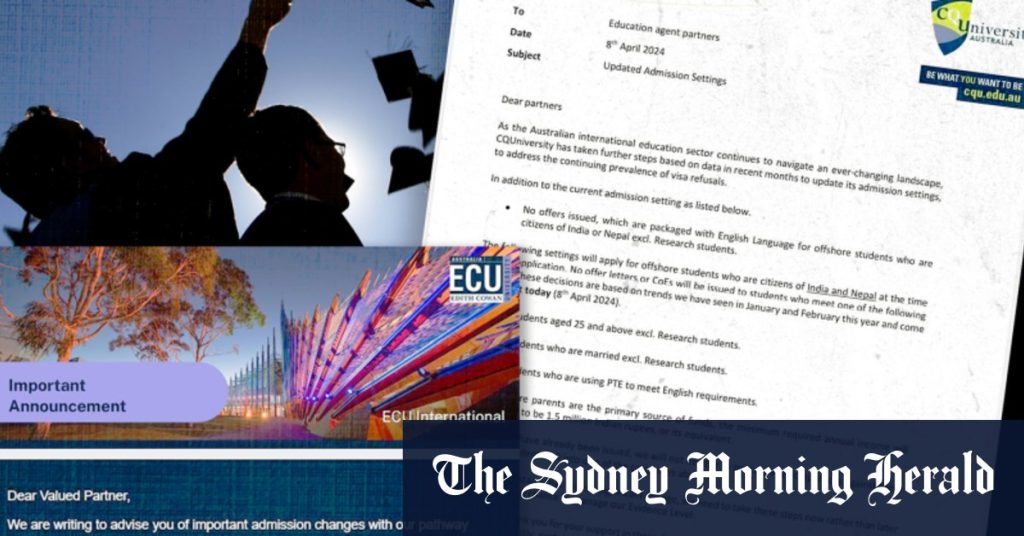Summarize this content to 2000 words in 6 paragraphs In addition, it would not offer any enrolments to offshore Indian and Nepalese applicants who are over 25, and/or married (except for research students).“We need to take these steps now rather than later to give us the best chance to manage our evidence level,” the letter read.Edith Cowan University, which maintained its level two rating, emailed education agents saying it will not accept Indian, Nepalese or Pakistani students into its English or academic pathways programs due to increased scrutiny from Home Affairs.Affiliated Edith Cowan College has also emailed agents saying it can no longer accept applications from Pakistani and Indian nationals for some diploma courses.A high rate of visa rejections contributes to a higher risk rating, resulting in universities restricting applications from students deemed a higher risk of visa refusal.While top-tier universities can recruit students from high-risk countries like India through a streamlined process, tier two and tier three universities are required to go through more complex checks for those students.The changes to foreign student approvals come as the latest Home Affairs data shows offshore student visa refusals are at a record high, with approvals sitting at a record low of 78.4 per cent in the 12 months to March.Ravi Singh, managing director of Indian-based education agency Global Reach, said he believed institutions such as Central Queensland University were taking the stringent measures after just avoiding moving to a higher risk level this month.“I am expecting more to do the same,” he said. “I strongly believe that students should be encouraged to choose the University based on their academic delivery and suitability to the student. The current system forces the students to choose the Universities based on ease in securing the visa.”Western Sydney University, which at the start of semester moved to cancel student enrolments to minimise visa rejections, had its risk ranking slip from a top-tier provider to level two this week.LoadingThe university did not respond to questions asking if it had been forced to restrict enrolments based on nationality or other demographic, but said an increase in visa rejections had impacted students who wished to start study this semester.The University of New England, based in regional NSW, had its rating drop from level 2 to the lowest level 3.Vice chancellor Professor Chris Moran said the federal government’s actions were having a significant impact on the institution’s ability to recruit international students.“The changes to visa assessment have a disproportionate impact on smaller universities,” he said.Murdoch University’s pro vice-chancellor international, Kelly Smith, said the government had shown an arbitrary approach to its visa decisions.“We therefore do not see a shift in the evidence level being a challenge, but rather some of the more arbitrary decisions being made in respect to individual applicants who we have thoroughly screened,” he said.A Charles Sturt University spokesperson said the university actively adjusts its genuine student screening based on evidenced trends and advice from the Department of Home Affairs, and was concerned about current approaches to visa processing.“We are … calling on the government to fundamentally review the current provider-risk based model and create a level and fair playing field for all students and providers,” they said.“Visa processing has become highly unpredictable, with refusal rates for the higher education sector the highest they have been in at least 20 years.”Naresh Gulati, former international student and chief executive of education agent management system Ascent One, said it should not be the responsibility of universities to assess the genuine nature or financial viability of overseas applicants.“I find it quite unfortunate that the providers have to, once again, go into the fire-fighting mode,” he said.“The whole provider rating system needs to be scrapped as it sends a negative signal, in the market, about the reputation of the provider.“Adelaide University said the restrictions on applications were in response to the government’s new genuine student requirements.“The University of Adelaide has consistently maintained a low-risk status (level one) as a result of its rigorous checks on applications undertaken by our agency partners in India,” a spokesperson said.A Central Queensland University spokesperson said in addition to managing its risk rating, it had a moral obligation to ensure prospective students had the best opportunity to successfully obtain a student visa.A spokesman for Home Affairs Minister Clare O’Neil said the government was working with the sector to assist providers navigating the changes.“However we make no apologies for bringing forward the reform which is necessary to protect the integrity and reputation of the system,” he said.Start the day with a summary of the day’s most important and interesting stories, analysis and insights. Sign up for our Morning Edition newsletter.
Keep Reading
Subscribe to Updates
Get the latest creative news from FooBar about art, design and business.
© 2025 Globe Timeline. All Rights Reserved.


